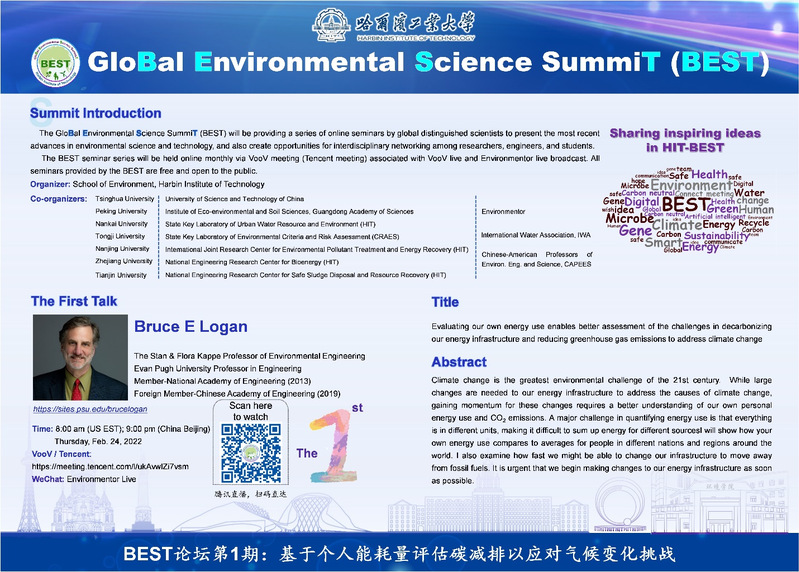BEST论坛讲座报告:基于个人能耗量评估碳减排以应对气候变化挑战
(Evaluating our own energy use enables better assessment of the challenges in decarbonizing our energy infrastructure and reducing greenhouse gas emissions to address climate change)
全球环境高峰论坛(GloBal Environmental Science SummiT, BEST)意在打造全球范围内的精品高端环境论坛,为研究学者、企业家、环境从业者以及学生等提供广泛的国际交流机会。BEST论坛涉及主题包括:气候变化与可持续发展、环境基准及环境健康、低碳发展、水处理、环境微生物、智慧水务等。
BEST将以腾讯会议直播的方式每月进行一次讲座。
应BEST的邀请,BEST第一讲将由来自宾夕法尼亚州州立大学的Bruce E Logan教授进行。
【时 间】:2022年2月24日 21:00—22:30
【直播平台】:腾讯会议直播(https://meeting.tencent.com/l/ukAvwlZi7vsm)

【报告摘要】
Climate change is the greatest environmental challenge of the 21st century. While large changes are needed to our energy infrastructure to address the causes of climate change, gaining momentum for these changes requires a better understanding of our own personal energy use and CO2 emissions. A major challenge in quantifying energy use is that everything is in different units, making it difficult to sum up energy for different sources. For example, food is reported in energy units of Calories (US) or megajoules (Europe), gasoline use is based on volume in gallons or liters, electric bills are typically reported in kilowatt hours (kWh), and natural gas can be expressed in BTU, CCF, or therm. To understand our own energy use in this talk I introduce the concept of the daily energy unit D and the daily CO2 emission unit C. By defining 1 D as the energy in food that you eat every day (2000 Calories, 8.4 megajoules) all energy use can be converted to D units. For CO2 emissions, 1 C is defined as the CO2 emitted each day by a person due to eating that food (2 lb/d or 0.9 kg/d). Therefore, we can easily compare energy and CO2 emissions for people around the world in terms of D and C based on food, electricity, and fossil fuel use. I will show how your own energy use compares to averages for people in different nations and regions around the world. I also examine how fast we might be able to change our infrastructure to move away from fossil fuels. Energy education is a key for catalyzing change and I think that Environmental Engineers are uniquely qualified to help others learn how energy use in their daily lives translates to CO2 emissions. They can lead in educating students on our college campuses and the public to make it easier to create and implement effective policies and technologies that address climate change. It urgent that we begin making changes to our energy infrastructure as soon as possible.
【主讲人简介】

Professor Bruce E. Logan is an Evan Pugh University Professor in Engineering, the Stan & Flora Kappe Professor of Environmental Engineering, and Director of the Engineering Energy & Environmental Institute at Penn State University. His current research efforts are in renewable energy production and the development of an energy sustainable water infrastructure. Dr. Logan has mentored over 140 graduate students and post docs and hosted over 40 international visitors to his laboratory. He is the author or co-author of several books and over 500 refereed publications (>100,000 citations, h-index=156; Google scholar). Logan is a member of the US National Academy of Engineering (NAE) and the Chinese Academy of Engineering (CAE), and a fellow of the American Association for the Advancement of Science (AAAS), the International Water Association (IWA), the Water Environment Federation (WEF), and the Association of Environmental Engineering & Science Professors (AEESP). Logan is a visiting professor at several universities including HIT, Tsinghua University, Dalian University of Technology (China), with ties to several other universities in Saudi Arabia, the UK, and Belgium. He received his Ph.D. in 1986 from the University of California, Berkeley, and prior to joining Penn State in 1997 he was at the University of Arizona in Tucson.
Bruce Logan教授被评为Evan Pugh 大学工程学教授,Stan & Flora Kappe 环境工程教授,宾夕法尼亚州立大学工程能源与环境研究所所长。最近的研究方向为可再生能源生产和能源可持续水基础设施的发展。Logan教授已指导了140多名研究生及博士后,并在其实验室接待了40多名国际学者。发表文章数量高达500多篇,H因子为156。Logan教授为美国工程院院士、中国工程院外籍院士、同时是美国科学促进会AAAS、国际水协会IWA、水环境联合会WEF、与环境科学与工程教授协会AEESP会士。Logan教授担任哈尔滨工业大学、清华大学、大连理工大学等多所中国大学的兼职教授,并与沙特阿拉伯、英国、比利时的其他几所大学有长足的交流与合作。Bruce logan教授于1986年获得博士学位,就读学校为加州伯克利大学。在1997年加入宾州州立大学工作之前,曾在亚利桑那大学-图森工作。

组织单位:哈尔滨工业大学环境学院
协办单位:清华大学环境学院
北京大学环境科学与工程学院
南开大学环境科学与工程学院
同济大学环境科学与工程学院
南京大学环境学院
浙江大学环境与资源学院
天津大学环境与生态研究院
中国科学技术大学环境科学与工程系
广东省科学院生态环境与土壤研究所
哈尔滨工业大学城市水资源与水环境国家重点实验室
中国环境科学研究院环境基准与风险评估国家重点实验室
哈尔滨工业大学污染物处理及能源化国际联合研究中心
哈尔滨工业大学污泥安全处置与资源化技术国家工程研究中心
哈尔滨工业大学生物能源开发利用工程研究中心
环境人Environmentor
国际水协IWA
北美华人环境工程与科学教授学会CAPEES



